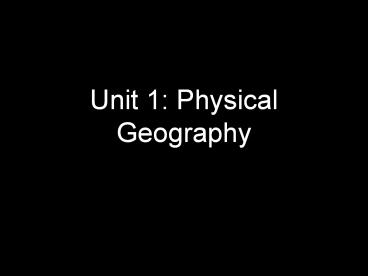Unit 1: Physical Geography - PowerPoint PPT Presentation
Title:
Unit 1: Physical Geography
Description:
What makes Earth a living planet ? What color do you see the most? Blue= Water, Water =Life Bodies of Water 71% of the earth is covered by salt water What are ... – PowerPoint PPT presentation
Number of Views:133
Avg rating:3.0/5.0
Title: Unit 1: Physical Geography
1
Unit 1 Physical Geography
2
What makes Earth a living planet?
What color do you see the most?
Blue Water, Water Life
3
Bodies of Water
Oceans and Seas
71 of the earth is covered by salt water What
are the major oceans?
Atlantic, Pacific, Arctic, Indian and Southern
4
Ocean Motion
- Currents
- Waves
- Tides
5
Hydrologic Cycle
The continuous circulation of water between the
atmosphere, the oceans and the earth.
6
Ground Water
Water that sits in the rock of the earth. The
water table is the level at which the rock is
saturated, or full.
7
Make your own Hydrologic cycle
- In your notes, create your own version of the
hydrologic cycle. Does not have to look like the
example.
8
Lakes, Rivers and Streams
Bodies of fresh water
9
Landforms
Relief The geographic feature that separates one
landform from another. It is the difference in
elevation from the lowest point to the highest.
4 types of Reliefs Mountains, hills, plains and
plateaus
10
Oceanic Landforms
Continental Shelf From the edge of a continent
to the deep part of the ocean.
Ridges, valleys, canyons, plains and mountains
all exist on the ocean floor...
11
Other Landforms
- Please turn to pgs 34-35 in your textbook
- Create your own landform glossary.
- List and define each landform using the Cornell
note format.
12
How the Earth is Shaped...
Our earth is MOVING!!
13
Tectonic Plates
Enormous moving pieces of the earths lithosphere
14
Types of Plate Movement
15
What Happens When the Plates Move??
Earthquakes
Earthquakes are measured using the Richter Scale.
The scale begins at 1 and has no upper limit...
What was the largest earthquake ever recorded?
9.5-Valdivia Chile
16
Tsunami Sometimes earthquakes cause a major wave
that hits the coast
17
Volcanoes Magma, gases, and water gather under
the earths mantle. Eventually, they push their
way out...
18
Ring of Fire A zone around the rim of the
Pacific ocean where most of the worlds volcanoes
are located.
19
External Forces..
- Weathering pg 42
- What is the difference between mechanical and
chemical weathering. Give three examples of how
each occurs. (3 for mechanical and 3 for
chemical) - Erosion - pg 43
- Take notes on the 3 types Erosion
(Characteristics of each) - What type of erosion is most likely to occur here
in the greater Houston area?
20
Vegetation.
- Read and take notes on the 3 types of vegetation
pg. 66 - What are their characteristics, Where are they
located? (this should be in with your notes)
21
Seasons
- The tilt of the earth is what causes seasons to
occur (Spring, Summer, Fall Winter) - Solstice Longest and shortest days of the year
- Equinox Equal day and night
22
Weather
- Weather The condition of the atmosphere at a
particular location and time. - Climate Weather conditions at a particular
location over a long period of time. - Whats the difference between weather and
climate? - Give an example
23
Weather Extremes
- Hurricanes A storm that forms over warm tropical
ocean waters (Typhoons in Asia) - Tornadoes A powerful funnel-shaped column of
spiraling air - Blizzard a heavy snowstorm with winds of more
than 35 miles per hour - Droughts a long period of time without rain fall
- Floods When water spreads over land not normally
covered in water
24
Factors that Affect Climate
- 5 factors that affect climate
- Wind Currents
- Ocean Currents
- Zones of Latitude
- Elevation
- Topography
- El Nino The warming of waters off the west coast
of South America (a natural change in climate)
25
Questions
- 1. From the 5 weather extremes name the one that
Houston has yet to experience. - 2. How does location affect climate?
26
Climate Regions (brief descriptions)
- Tropical Wet Little variation in temperature,
always hot and rainy - Tropical Wet Dry Rainy season in the summer,
and a dry season in the winter - Semiarid Typically found around deserts or
interior of continents, small amount of rain - Desert receive less than 10 inches of rain a
year (can be hot or cold)
27
Climate Regions (brief descriptions)
- Mediterranean Dry hot summers, winters are
cool rainy - Marine West Coast Cloudy, foggy rainy, near an
ocean - Humid Subtropical Long summers of heat and
humidity - Humid Continental mid-latitude interiors of the
northern hemisphere, various temperatures
28
Climate Regions (brief descriptions)
- Subartic Huge variations in temperature, long
freezing season - Tundra Flat, treeless land surrounding the Artic
Circle - Ice Cap Snow, ice and permanently freezing
temperatures - Highlands Rugged mountain areas
29
Questions
- 3. Which climate zone does Houston fall into?
- 4. Discuss with your neighbor which climate zone
you would prefer to live in and why.































